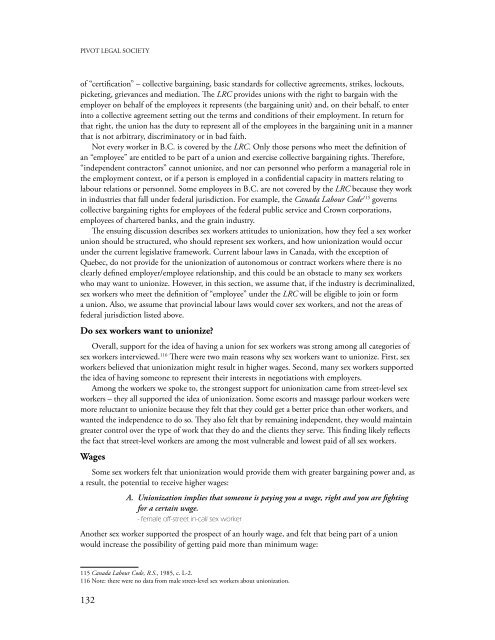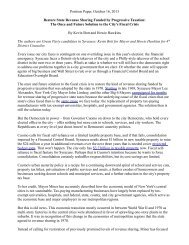PIVOT LEGAL SOCIETYof “certification” – collective bargaining, basic st<strong>and</strong>ards for collective agreements, strikes, lockouts,picketing, grievances <strong>and</strong> mediation. The LRC provides unions with the right to bargain with theemployer on behalf of the employees it represents (the bargaining unit) <strong>and</strong>, on their behalf, to enterinto a collective agreement setting out the terms <strong>and</strong> conditions of their employment. In return forthat right, the union has the duty to represent all of the employees in the bargaining unit in a mannerthat is not arbitrary, discriminatory or in bad faith.Not every <strong>work</strong>er in B.C. is covered by the LRC. Only those persons who meet the definition ofan “employee” are entitled to be part of a union <strong>and</strong> exercise collective bargaining rights. Therefore,“independent contractors” cannot unionize, <strong>and</strong> nor can personnel who perform a managerial role inthe employment context, or if a person is employed in a confidential capacity in matters relating tolabour relations or personnel. Some employees in B.C. are not covered by the LRC because they <strong>work</strong>in industries that fall under federal jurisdiction. For example, the Canada Labour Code 115 governscollective bargaining rights for employees of the federal public service <strong>and</strong> Crown corporations,employees of chartered banks, <strong>and</strong> the grain industry.The ensuing discussion describes sex <strong>work</strong>ers attitudes to unionization, how they feel a sex <strong>work</strong>erunion should be structured, who should represent sex <strong>work</strong>ers, <strong>and</strong> how unionization would occurunder the current legislative frame<strong>work</strong>. Current labour laws in Canada, with the exception ofQuebec, do not provide for the unionization of autonomous or contract <strong>work</strong>ers where there is noclearly defined employer/employee relationship, <strong>and</strong> this could be an obstacle to many sex <strong>work</strong>erswho may want to unionize. However, in this section, we assume that, if the industry is decriminalized,sex <strong>work</strong>ers who meet the definition of “employee” under the LRC will be eligible to join or forma union. Also, we assume that provincial labour laws would cover sex <strong>work</strong>ers, <strong>and</strong> not the areas offederal jurisdiction listed above.Do sex <strong>work</strong>ers want to unionize?Overall, support for the idea of having a union for sex <strong>work</strong>ers was strong among all categories ofsex <strong>work</strong>ers interviewed. 116 There were two main reasons why sex <strong>work</strong>ers want to unionize. First, sex<strong>work</strong>ers believed that unionization might result in higher wages. Second, many sex <strong>work</strong>ers supportedthe idea of having someone to represent their interests in negotiations with employers.Among the <strong>work</strong>ers we spoke to, the strongest support for unionization came from street-level sex<strong>work</strong>ers – they all supported the idea of unionization. Some escorts <strong>and</strong> massage parlour <strong>work</strong>ers weremore reluctant to unionize because they felt that they could get a better price than other <strong>work</strong>ers, <strong>and</strong>wanted the independence to do so. They also felt that by remaining independent, they would maintaingreater control over the type of <strong>work</strong> that they do <strong>and</strong> the clients they serve. This finding likely reflectsthe fact that street-level <strong>work</strong>ers are among the most vulnerable <strong>and</strong> lowest paid of all sex <strong>work</strong>ers.WagesSome sex <strong>work</strong>ers felt that unionization would provide them with greater bargaining power <strong>and</strong>, asa result, the potential to receive higher wages:A. Unionization implies that someone is paying you a wage, right <strong>and</strong> you are fightingfor a certain wage.- female off-street in-call sex <strong>work</strong>erAnother sex <strong>work</strong>er supported the prospect of an hourly wage, <strong>and</strong> felt that being part of a unionwould increase the possibility of getting paid more than minimum wage:115 Canada Labour Code, R.S., 1985, c. L-2.116 Note: there were no data from male street-level sex <strong>work</strong>ers about unionization.132
BEYOND DECRIMINALIZATION: <strong>Sex</strong> Work, <strong>Human</strong> <strong>Rights</strong> <strong>and</strong> a <strong>New</strong> Frame<strong>work</strong> for Law ReformA. And the first thing we would do is fight for slightly above minimum wages. We wouldhave to have minimum $10.- female off-street out-call sex <strong>work</strong>erUnionization could offer sex <strong>work</strong>ers the opportunity to bargain collectively for better wages. Canadianstatistics show that, on average, unionized employees <strong>and</strong> non-union employees <strong>work</strong>ing under acollective agreement earn significantly more than non-unionized employees. 117Representation on issues faced by <strong>work</strong>ersMany sex <strong>work</strong>ers supported unionization as a way to ensure that their concerns <strong>and</strong> grievances areheard, that health <strong>and</strong> safety conditions are enforced, <strong>and</strong> that there is a formal mechanism enablingthem to negotiate with their employers:A. [I]f we were unionized, <strong>and</strong> we had our union rep <strong>and</strong> like someone who wouldspeak for us girls, then I would be open to that.- female street-level sex <strong>work</strong>erSome sex <strong>work</strong>ers felt that unionization would create solidarity with other <strong>work</strong>ers, <strong>and</strong> wouldprovide a more powerful voice for sex <strong>work</strong>ers:A. And solidarity. Y’know, having somewhere to go, with issues <strong>and</strong> things? And havesome – y’know, if enough issues come up? Then there is somewhere, a recognized organization,by the public, to give voice. Y’know, a dozen women have come forwardwith this problem – could speak in solidarity for everybody?A. [Y]ou would be able to avail yourself of legal services if you needed them, you wouldhave a voice if you need a voice, the media would be well informed about needs,maybe de-stigmatization could occur, that to health benefits <strong>and</strong> things like that,coverage, so maybe, you know, maybe, maybe they’ve got a point.- female off-street out-call sex <strong>work</strong>ersOther sex <strong>work</strong>ers thought that unionization would create better occupational health <strong>and</strong> safety st<strong>and</strong>ardsin a <strong>work</strong>place <strong>and</strong> that <strong>work</strong>place violence would be reduced:A. What I think is happening, when bad dates happen . . . so when that happens thereis no effective way for us to deal with that. Rather than it just being put on a piece ofpaper, <strong>and</strong> reported, it is like . . . there should be some sort of way to link them withcharges that stick. You know, do something. Right? You know, maybe a union orsomething, it is not okay for these guys to come into town <strong>and</strong> doing what ever.- female street-level sex <strong>work</strong>erAnother project participant suggested that her <strong>work</strong>ing conditions would improve of she had a formaladvocate:A. . . . we could complain to somebody. You know, have[complaints] looked into. Forexample, the <strong>work</strong> where I <strong>work</strong> now, she turns off the heaters on the floors in thewinter for us. So we have this one minute heater that’s turning around in the room.So we have 14 girls that are freezing without robes on. That’s cruel, <strong>and</strong> who are wegoing to complain to? The girls have other issues too, labour complaints or whateverbut no one takes it seriously, no one comes in <strong>and</strong> inspects it.- female off-street in-call sex <strong>work</strong>er117 “Average hourly wages of employees by selected characteristics <strong>and</strong> profession, unadjusted data, by provinces (monthly) (Canada),”online: Statistics Canada .133
- Page 4:
PIVOT LEGAL SOCIETYPart 2: Municipa
- Page 21 and 22:
BEYOND DECRIMINALIZATION: Sex Work,
- Page 23 and 24:
BEYOND DECRIMINALIZATION: Sex Work,
- Page 25 and 26:
BEYOND DECRIMINALIZATION: Sex Work,
- Page 27 and 28:
BEYOND DECRIMINALIZATION: Sex Work,
- Page 29 and 30:
BEYOND DECRIMINALIZATION: Sex Work,
- Page 31 and 32:
BEYOND DECRIMINALIZATION: Sex Work,
- Page 33 and 34:
BEYOND DECRIMINALIZATION: Sex Work,
- Page 35 and 36:
BEYOND DECRIMINALIZATION: Sex Work,
- Page 37 and 38:
BEYOND DECRIMINALIZATION: Sex Work,
- Page 39 and 40:
BEYOND DECRIMINALIZATION: Sex Work,
- Page 41 and 42:
BEYOND DECRIMINALIZATION: Sex Work,
- Page 43 and 44:
BEYOND DECRIMINALIZATION: Sex Work,
- Page 45 and 46:
BEYOND DECRIMINALIZATION: Sex Work,
- Page 47 and 48:
BEYOND DECRIMINALIZATION: Sex Work,
- Page 49 and 50:
BEYOND DECRIMINALIZATION: Sex Work,
- Page 51 and 52:
BEYOND DECRIMINALIZATION: Sex Work,
- Page 53 and 54:
BEYOND DECRIMINALIZATION: Sex Work,
- Page 55 and 56:
BEYOND DECRIMINALIZATION: Sex Work,
- Page 57 and 58:
BEYOND DECRIMINALIZATION: Sex Work,
- Page 59 and 60:
BEYOND DECRIMINALIZATION: Sex Work,
- Page 61 and 62:
BEYOND DECRIMINALIZATION: Sex Work,
- Page 63 and 64:
BEYOND DECRIMINALIZATION: Sex Work,
- Page 65 and 66:
BEYOND DECRIMINALIZATION: Sex Work,
- Page 67 and 68:
BEYOND DECRIMINALIZATION: Sex Work,
- Page 69 and 70:
BEYOND DECRIMINALIZATION: Sex Work,
- Page 71 and 72:
BEYOND DECRIMINALIZATION: Sex Work,
- Page 73 and 74:
BEYOND DECRIMINALIZATION: Sex Work,
- Page 75 and 76:
BEYOND DECRIMINALIZATION: Sex Work,
- Page 77 and 78:
BEYOND DECRIMINALIZATION: Sex Work,
- Page 79 and 80:
BEYOND DECRIMINALIZATION: Sex Work,
- Page 81 and 82: BEYOND DECRIMINALIZATION: Sex Work,
- Page 83 and 84: BEYOND DECRIMINALIZATION: Sex Work,
- Page 85 and 86: BEYOND DECRIMINALIZATION: Sex Work,
- Page 87 and 88: BEYOND DECRIMINALIZATION: Sex Work,
- Page 89 and 90: BEYOND DECRIMINALIZATION: Sex Work,
- Page 91 and 92: BEYOND DECRIMINALIZATION: Sex Work,
- Page 93 and 94: BEYOND DECRIMINALIZATION: Sex Work,
- Page 95 and 96: BEYOND DECRIMINALIZATION: Sex Work,
- Page 97 and 98: BEYOND DECRIMINALIZATION: Sex Work,
- Page 99 and 100: BEYOND DECRIMINALIZATION: Sex Work,
- Page 101 and 102: BEYOND DECRIMINALIZATION: Sex Work,
- Page 103 and 104: BEYOND DECRIMINALIZATION: Sex Work,
- Page 105 and 106: BEYOND DECRIMINALIZATION: Sex Work,
- Page 107 and 108: BEYOND DECRIMINALIZATION: Sex Work,
- Page 109 and 110: BEYOND DECRIMINALIZATION: Sex Work,
- Page 111 and 112: BEYOND DECRIMINALIZATION: Sex Work,
- Page 113 and 114: BEYOND DECRIMINALIZATION: Sex Work,
- Page 115 and 116: BEYOND DECRIMINALIZATION: Sex Work,
- Page 117 and 118: BEYOND DECRIMINALIZATION: Sex Work,
- Page 119 and 120: BEYOND DECRIMINALIZATION: Sex Work,
- Page 121 and 122: BEYOND DECRIMINALIZATION: Sex Work,
- Page 123 and 124: BEYOND DECRIMINALIZATION: Sex Work,
- Page 125 and 126: BEYOND DECRIMINALIZATION: Sex Work,
- Page 127 and 128: BEYOND DECRIMINALIZATION: Sex Work,
- Page 129 and 130: BEYOND DECRIMINALIZATION: Sex Work,
- Page 131: BEYOND DECRIMINALIZATION: Sex Work,
- Page 135 and 136: BEYOND DECRIMINALIZATION: Sex Work,
- Page 137 and 138: BEYOND DECRIMINALIZATION: Sex Work,
- Page 139 and 140: BEYOND DECRIMINALIZATION: Sex Work,
- Page 141 and 142: BEYOND DECRIMINALIZATION: Sex Work,
- Page 143 and 144: BEYOND DECRIMINALIZATION: Sex Work,
- Page 145 and 146: BEYOND DECRIMINALIZATION: Sex Work,
- Page 147 and 148: BEYOND DECRIMINALIZATION: Sex Work,
- Page 149 and 150: BEYOND DECRIMINALIZATION: Sex Work,
- Page 151 and 152: BEYOND DECRIMINALIZATION: Sex Work,
- Page 153 and 154: BEYOND DECRIMINALIZATION: Sex Work,
- Page 155 and 156: BEYOND DECRIMINALIZATION: Sex Work,
- Page 157 and 158: BEYOND DECRIMINALIZATION: Sex Work,
- Page 159 and 160: BEYOND DECRIMINALIZATION: Sex Work,
- Page 161 and 162: BEYOND DECRIMINALIZATION: Sex Work,
- Page 163 and 164: BEYOND DECRIMINALIZATION: Sex Work,
- Page 165 and 166: BEYOND DECRIMINALIZATION: Sex Work,
- Page 167 and 168: BEYOND DECRIMINALIZATION: Sex Work,
- Page 169 and 170: BEYOND DECRIMINALIZATION: Sex Work,
- Page 171 and 172: BEYOND DECRIMINALIZATION: Sex Work,
- Page 173 and 174: BEYOND DECRIMINALIZATION: Sex Work,
- Page 175 and 176: BEYOND DECRIMINALIZATION: Sex Work,
- Page 177 and 178: BEYOND DECRIMINALIZATION: Sex Work,
- Page 179 and 180: BEYOND DECRIMINALIZATION: Sex Work,
- Page 181 and 182: BEYOND DECRIMINALIZATION: Sex Work,
- Page 183 and 184:
BEYOND DECRIMINALIZATION: Sex Work,
- Page 185 and 186:
BEYOND DECRIMINALIZATION: Sex Work,
- Page 187 and 188:
BEYOND DECRIMINALIZATION: Sex Work,
- Page 189 and 190:
BEYOND DECRIMINALIZATION: Sex Work,
- Page 191 and 192:
BEYOND DECRIMINALIZATION: Sex Work,
- Page 193 and 194:
BEYOND DECRIMINALIZATION: Sex Work,
- Page 195 and 196:
BEYOND DECRIMINALIZATION: Sex Work,
- Page 197 and 198:
BEYOND DECRIMINALIZATION: Sex Work,
- Page 199 and 200:
BEYOND DECRIMINALIZATION: Sex Work,
- Page 201 and 202:
BEYOND DECRIMINALIZATION: Sex Work,
- Page 203 and 204:
BEYOND DECRIMINALIZATION: Sex Work,
- Page 205 and 206:
BEYOND DECRIMINALIZATION: Sex Work,
- Page 207 and 208:
BEYOND DECRIMINALIZATION: Sex Work,
- Page 209 and 210:
BEYOND DECRIMINALIZATION: Sex Work,
- Page 211 and 212:
BEYOND DECRIMINALIZATION: Sex Work,
- Page 213 and 214:
BEYOND DECRIMINALIZATION: Sex Work,
- Page 215 and 216:
BEYOND DECRIMINALIZATION: Sex Work,
- Page 217 and 218:
BEYOND DECRIMINALIZATION: Sex Work,
- Page 219 and 220:
BEYOND DECRIMINALIZATION: Sex Work,
- Page 221 and 222:
BEYOND DECRIMINALIZATION: Sex Work,
- Page 223 and 224:
BEYOND DECRIMINALIZATION: Sex Work,
- Page 225 and 226:
BEYOND DECRIMINALIZATION: Sex Work,
- Page 227 and 228:
BEYOND DECRIMINALIZATION: Sex Work,
- Page 229:
BEYOND DECRIMINALIZATION: Sex Work,
















